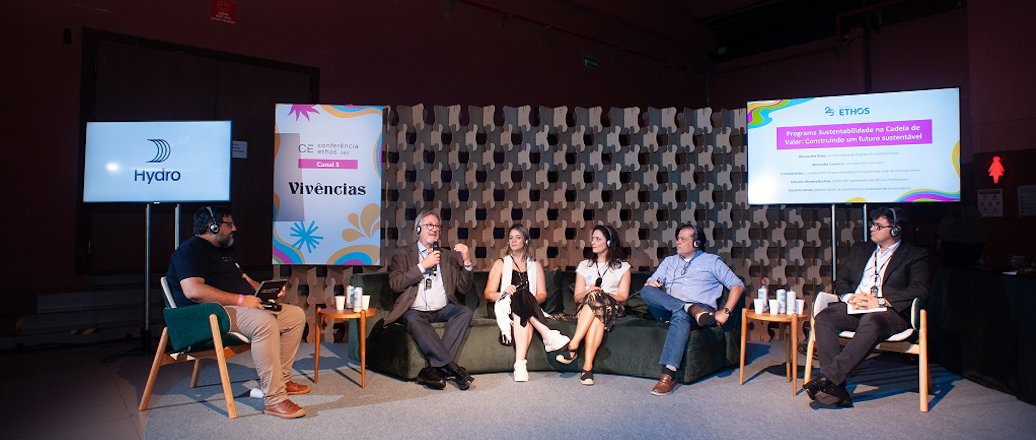Hydro took part in the Ethos 360º Conference in São Paulo, on November 21st, considered the largest event of its kind in Latin America and one of the largest in the world. The conference was held on the 21st and 22nd, with intense debates and experience sharing, covering topics such as climate change, socio-environmental issues, corporate social responsibility, and addressing Brazilian inequalities, among others. The event also concluded the celebrations of the 25th anniversary of Ethos Institute's operations in the country.
Hydro's Director of Sustainability and Social Impact, Eduardo Figueiredo, participated in the opening of the conference with a video message where he highlighted that participating in the event is strategic for the company, “as it is a moment for debates with the government, society, and all actors who are partners in investments for territorial development and the well-being of the Amazon communities.”
Hydro's Partnership Manager, Milene Maués, took part in the panel on "Partnerships that promote sustainable development in the Amazon region of Pará," along with Denyse Mello from the Partners for the Amazon Platform (PPA) and Miriam Amerlin, representing the Sustainable Barcarena Initiative (IBS). Milene highlighted over 20 ongoing initiatives in Pará aimed at developing the region in various pillars, such as education, labor, income generation, biodiversity, and quality of life. She also mentioned several important partnerships, like the agreement with the Federal University of Pará (UFPA) for technical cooperation with various research lines, such as the production of low-carbon cement and synthetic aggregate for concrete, from the bauxite residue of Hydro Alunorte operations, and the partnership with the Brazil-Norway Biodiversity Research Consortium (BRC), which supports science-based knowledge in the Amazon and mining areas. Founded in 2013, the BRC is a partnership between Hydro and four research institutions: the Federal University of Pará (UFPA), the Goeldi Museum of Pará (MPEG), the Federal Rural University of the Amazon (UFRA), and the University of Oslo (UiO).
“Our partnerships are making a difference in the territories we operate in, and an example to highlight are the projects developed with funding from the Hydro Sustainability Fund (FSH). A union of Hydro, Albras, and Alunorte companies around building a better and more sustainable future, through generating positive and lasting impacts and supporting community-designed projects,” highlights Milene.
This was the fifth and last edition of the Ethos 360º Conference in 2023. Before, there were two in-person editions in Rio de Janeiro (RJ) and Belém (PA), and two virtual editions. The event in São Paulo featured representatives from the federal government, national and international experts, and members of the private sector.
On the last day of the event, the 22nd, Hydro's Senior Manager of Governance and Supplier Quality, Eduardo Kaiser, participated in the panel "Sustainability Program in the Value Chain: Building a Sustainable Future," emphasizing the importance of ESG practices in the value chain of reference companies. The program, an initiative of the Ethos Institute, is a progressive response to the challenges faced by companies in integrating sustainability into their supplier chain. It offers not just education and guidance but also practical tools to measure and improve sustainable performance. In his speech, Kaiser discussed “how it is increasingly important for companies to act socially responsibly, ensuring rights and promoting a more just, respectful, inclusive, and sustainable society. The logic is that the entire value chain has opportunities to avoid or at least reduce considerable risks to society, the environment, and to the companies themselves. This is already a business requirement with corporate markets, and companies need to adapt or they will not survive,” reveals Kaiser.
During the event, three materials from the Ethos Institute were launched: a Private Integrity Management Guide (GGIP), a novel tool aimed at strengthening integrity programs in companies; the Climate Federal Pact, an initiative that highlights the urgency of updating public policies related to climate and strengthening Brazil's response to climate change; and the Draft of the Environmental Working Group, a document that expands the discussion on the carbon market, focusing on Nature-Based Solutions (NbS).
About Ethos Institute
The Ethos Institute of Companies and Social Responsibility is the pioneering Brazilian civil society organization in mobilizing companies for fair and responsible action. Ethos was born ESG, as since 1998, the agendas of social responsibility, ethics, and sustainability have guided all its activities. The Institute develops indicators to assist companies in understanding their situation and the paths to becoming more diverse, inclusive, and ethical. With more than 460 associates, Ethos carries out various collaborative advocacy activities and coordinates the Brazilian Climate Change Conference alongside the sector's leading organizations.
: November 23, 2023







